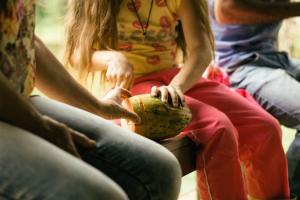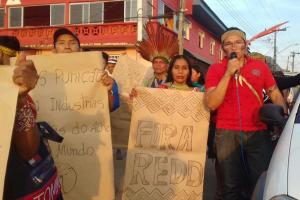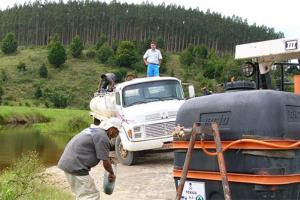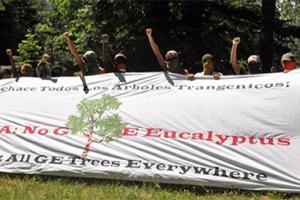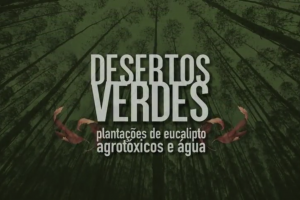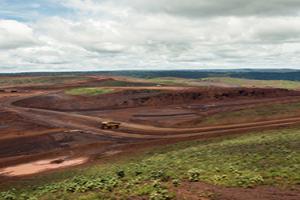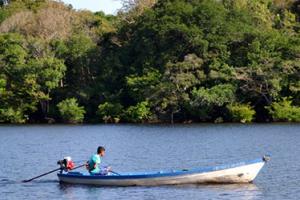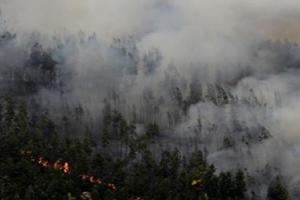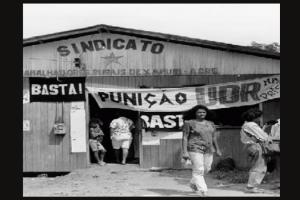Interview to Roberto Liebgott, coordinator of “Regional Sul do Conselho Indigenista Missionário” – CIMI (The South Regional from the Indigenous Missionary Council) in Brazil.
WRM: Brazil's recognition of indigenous rights in the law has been an example for other countries in the world, and has served as inspiration for indigenous peoples and their struggles in other countries. What would you highlight about this?
Brazil
Bulletin articles
23 November 2017
Other information
23 November 2017
Since 2003, the camp that bears the name of environmentalist, José Lutzenberger, has reconciled the production of foods free of agrochemicals with the recovery of native “Mata Atlantica” forest. For this reason, it was chosen for the Juliana Santilli award, in the category of increasing and conserving agro-biodiversity. The area, which for decades was degraded by landowners' cattle ranching activities, has been slowly recovering.
Action alerts
3 October 2017
Indigenous Peoples from Acre in Brazil declare their rejection of REDD policies and their support for the work carried out by the Indigenous Missionary Council (CIMI). Feijó, State of Acre, Brazil, September 28th, 2017.
LETTER OF REJECTION AND REQUEST FOR CLARIFICATION
Action alerts
28 September 2017
REDD Early Movers – Jurisdictional REDD
Bulletin articles
21 September 2017
The process of territorial transformation in the southernmost part of Bahia is closely intertwined with agriculture in Brazil, and is based on an extremely unequal territorial structure that has been in place since colonial times. But this has recently been exacerbated by the imposition of a single model of extensive and intensive production, using land, water, agrochemicals, chemical inputs, large machinery and biotechnology. This is agribusiness in general, and in particular, the eucalyptus plantations that supply huge pulp mills.
Bulletin articles
21 September 2017
Photo: STOP GE Trees Campaign
Multimedia
7 September 2017
Documentary by Centro de Estudos e Pesquisas para o Desenvolvimento do Extremo Sul da Bahia - CEPEDES, Brazil.
Bulletin articles
23 August 2017
Action alerts
4 August 2017
Press Release
More than 80 organizations and individuals from all over the world sent today the letter enclosed below to relevant authorities in Brazil, Germany and California / USA rejecting “any and all attempts to intimidate or censor people and organizations that critique and oppose the environmental and climate policies implemented by the Acre government.”
Action alerts
24 July 2017
July 21, 2017
Dear friends,
We need your support to the motion enclosed below in solidarity with leaders from communities and organizations from the State of Acre in Brazil who are being pressured and threatened due to their critics and oposition to the climate and environmental policies being implemented by the state government in Acre.
Bulletin articles
11 July 2017
The January 2017 bulletin focused on the numerous initiatives being announced worldwide that promote the expansion of millions of hectares of tree plantations (Bulletin 228, January 2017). At the same time, the plantations and pulp and paper industries, among others, are strongly pushing for Genetically Engineered (GE) trees – eucalyptus and poplar in particular – to be licensed for commercial use. Consequently, this time, the editorial of the WRM Bulletin warns about the promotion of GE trees.
Bulletin articles
10 July 2017
Dercy Teles of Carvalho was the first female president of a Brazilian Rural Workers' Union, in the town of Xapuri, Acre in 1981. Xapuri became known nationally and internationally because of the union leader who succeeded Dercy: Chico Mendes. We spoke with Dercy at the recent gathering—"Effects of environmental and climate policies on traditional peoples: forest management, REDD, PES [Payment for Environmental Services]"—about the rich history of the rubber tappers' popular movement, including difficulties, lessons learned and challenges (1).

